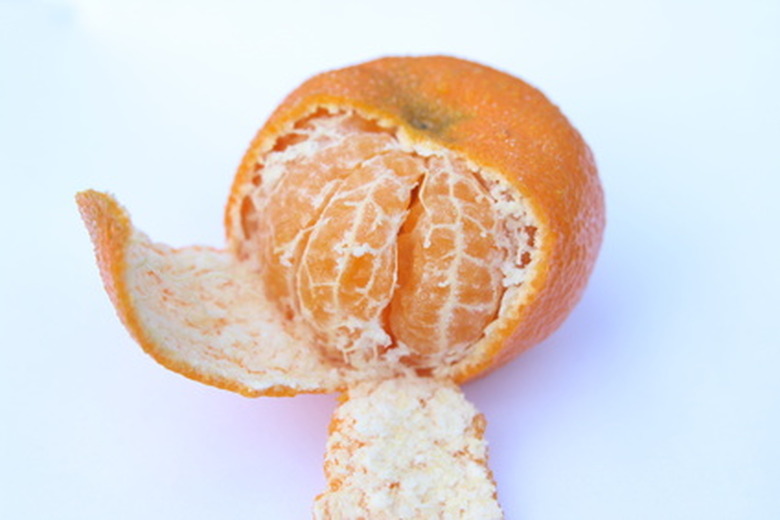How To Care For A Satsuma Mandarin Orange Tree Plant
Things Needed
- Garden hose
- Ammonium sulfate (21-0-0 NPK fertilizer)
- Hoe or contact herbicide
- Blanket
- Neem oil (optional)
Native to Japan, Satsumas are a variety of mandarin oranges, or tangerines, that are nearly seedless with a bright reddish-orange peel. Satsuma mandarin oranges grow best in semitropical and tropical regions, where hard frosts and freezes are rare. However, Satsuma mandarin orange trees can easily tolerate winter temperatures down to 26 degrees Fahrenheit. These citrus trees are relatively small in stature, reaching about 10 feet tall and wide at most at maturity. Plant your Satsuma mandarin orange trees beside the south wall of your house to provide the trees with extra cold protection in the winter.
Step 1
Water your newly planted Satsuma mandarin orange tree once every two or three days for the first two weeks, and then once every week to 10 days during the rest of the first growing season. Water the tree deeply and evenly to soak the soil around the root ball.
- Native to Japan, Satsumas are a variety of mandarin oranges, or tangerines, that are nearly seedless with a bright reddish-orange peel.
Step 2
Feed your Satsuma mandarin orange trees three times per year, in February, May and September. Feed the tree with a total of one cup of ammonium sulfate (21-0-0 NPK fertilizer) per year, divided into three equal applications, for each year of tree age. Begin fertilizing your newly planted Satsuma tree only after new growth emerges on the tree.
Step 3
Water your mature Satsuma mandarin orange trees slowly and deeply once very two weeks throughout the growing season, soaking the soil down to and around the roots.
Step 4
Keep weeds and grasses at least 1 foot away from your Satsuma trees. Hoe away the weeds, pull them by hand or get rid of them by spraying a contact herbicide on the weeds. Be careful not to get any of the herbicide on the tree trunk.
- Feed your Satsuma mandarin orange trees three times per year, in February, May and September.
- Water your mature Satsuma mandarin orange trees slowly and deeply once very two weeks throughout the growing season, soaking the soil down to and around the roots.
Step 5
Protect your Satsuma mandarin orange trees from frosts and freezes during the winter and early spring by covering the younger trees with a blanket when severe cold temperatures threaten. Create a soil bank around the tree's trunk in late November or early December, then remove the soil in March or April when the freezing weather is finished.
Tip
Ensure that your container-grown Satsuma mandarin orange trees receive enough sunlight. Set the trees outdoors during the late spring, summer and early autumn in a spot that has direct, full sunlight for at least half of the day.
Warning
Don't make a shallow watering ring or basin around the newly planted Satsuma tree. Instead, create an above-grade ridge of soil in a 2-foot-wide circle around the mandarin orange tree after planting it. You can water the newly planted Satsuma simply by pouring water into the ridged ring to fill it. Watch out for the citrus leaf miner infesting your Satsuma mandarin orange trees. This insect will cause the new leaves on the trees to curl. To treat and prevent the citrus leaf miner, spray your mandarin orange trees with neem oil, coating both the tops and undersides of the new-growth leaves in spring and repeating the spray about seven days later.
